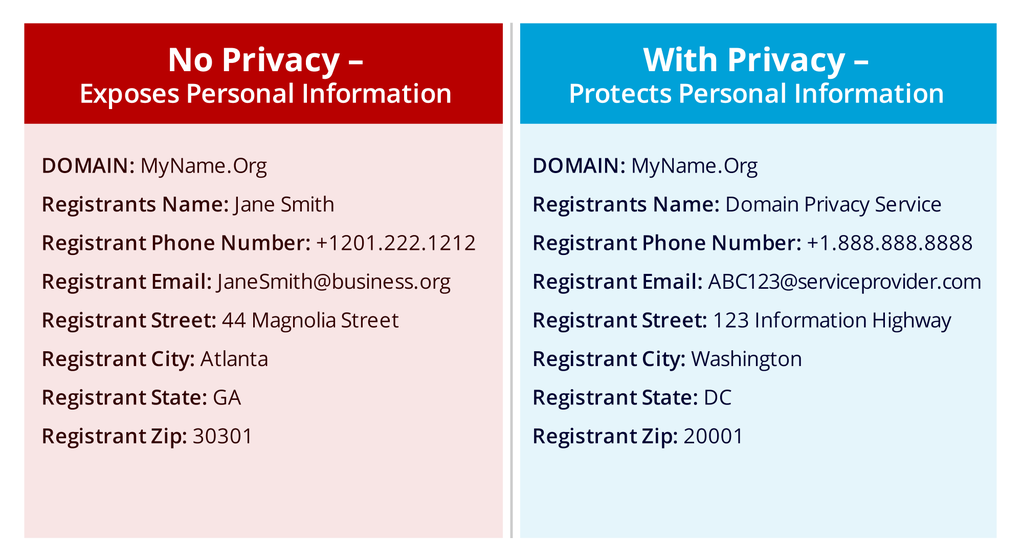Do you have a small business website? If so, you should know about a change that’s been proposed by a working group within the Internet Corporation for Assigned Names & Numbers (ICANN) and could harm your business website, your business and even your personal privacy.
ICANN is the international organization responsible for regulating the Internet’s domain name system. Any time a domain name is registered with any registrar, the registrar has to enter the domain name owner’s personal contact information, including their name, phone number, mailing address, and email address. All of this information is available to the general public through the WHOIS database. In other words, if you use your home address to register the domain name for your website, all it takes is a quick search of the WHOIS database to find out exactly where you live.
Obviously, having your personal contact information readily available to anyone with a computer and an internet connection can lead to many problems, ranging from unwanted spam and telemarketing calls to harassment and identity theft. That’s why a service called Domain Privacy (also known as private registration) allows you to keep your personal details confidential.
With Domain Privacy, the registrar protects your personal information by replacing it on the WHOIS database with a proxy company that acts as an agent on your behalf. The WHOIS information does not reveal your identity as the registrant and instead displays the name and contact information of the domain proxy company, which can process any communications directed to you via the alternate contact information.
But now a working group within ICANN wants to change all that. This group has proposed changes which would impose restrictions on domain registrars that essentially takes the “private” out of these domain privacy services.
If there is a legitimate need to obtain a private registrant’s contact information that supersedes any privacy concerns, there is an existing process that addresses this issue. For example, if your website is impacted by a legal issue and a law enforcement agency gets involved — the registrar may release the relevant information upon receipt of authorized documentation.
Some members of the working group claim their proposed changes would result in exposing criminals hiding behind domain privacy. However, these infrequent scenarios are already addressed by registrars in defined processes. The proposed requirements would ignore this reality and treat every domain owner equally.
Law enforcement officials know that people who commit crimes don’t purchase private registration. The criminals simply provide false information when they register a domain name. So in the case of law breakers, the WHOIS data related to their domain name is often worthless.
Here are some things that could happen if domain privacy is eliminated:
You own a home-based business, and list contact information for your business (business phone number, P.O. box and email) on your business website. However, the domain registration is linked to your home address. If domain privacy services are rescinded, prospective customers could locate your personal information within WHOIS and come to your home or call your home. At the very least, this would be an invasion of privacy intruding on your personal life and family time; in a worst case scenario, it could expose you to harassment or worse from an unhappy customer.
You’re getting ready to launch a business, and have registered all the variations of your domain name. But then a competitor sees your domain name and files a complaint with the registrar that you are violating their trademark. (In reality, they saw the domain name, then filed a trademark on it in a foreign country so they could steal it from you.) Should your registrar be forced to cancel your WHOIS privacy service and provide your contact details? Remember, at this point, you don’t even have a business yet—you’re just a private individual.
Small business owners and individuals’ online privacy would be greatly harmed by the proposed changes of this ICANN working group. I learned about this risk through one of my company’s clients, Web.com, which is taking a stand by supporting the Save Domain Privacy initiative. Join them and protect your privacy online by:
- Providing feedback to ICANN’s “Public Comment”. Write an email about how the change would affect your business, and send it to comments-ppsai-initial-05may15@icann.org by July 7, 2015. Include a statement such as the following: “I am a small business owner/individual and believe that I have a right to protect against the disclosure of my personal contact information through the use of domain privacy services. I am opposed to the changes proposed by this ICANN working group.”
- Signing the online petition available at savedomainprivacy.org. The organization will send the list of signatures to ICANN on July 7, 2015.







